#abdulqadir
Photo
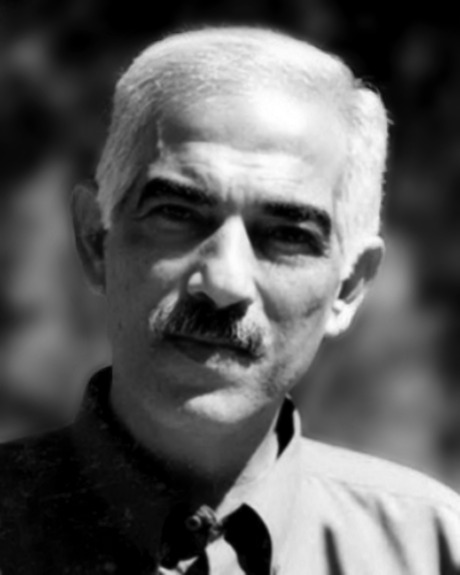
Iraqi poet Ra’ad Abdulqadir
14 notes
·
View notes
Quote
I am afraid I am slipping away from me.
Abdulqadir Alkutayabi, tr. & ed. Adil Babikir, Modern Sudanese Poetry: An Anthology; “I Miss Something”
#literature#poetry#abdulqadir alkutayabi#modern sudanese poetry: an anthology#that long shadow on the lawn#divine‚ glorious selfhood#mourn with the moon#sudanese lit#m#x
499 notes
·
View notes
Text
Shaykh Rabi' bin Hadi al-Madkhali (حفظه الله) said:
"The starting point for every just Muslim who is always seeking for the truth is:
{Say, "Produce your proof, if you are truthful."} [al-Baqarah: 111]"
[Al-Majmu' 8/81 | Transl. by Abu 'Affan 'AbdulQadir]
6 notes
·
View notes
Text

“I am afraid I am slipping away from me.”
~•Abdulqadir Alkutayabi•~
#Abdulqadir Alkutayabi, tr. & ed. Adil Babikir, Modern Sudanese Poetry: An Anthology; “I Miss Something”
19 notes
·
View notes
Text
The Israeli occupation forces detain the mother of Abdulqadir Qawasmi, one of the three Palestinians who carried out the shooting at a military checkpoint near Bethlehem, today. 16.11.23
For God's sake, she can't even walk properly.
#gaza#fucking hell#free gaza#gaza strip#gazaunderattack#free palestine#save gaza#palestine#freepalastine🇵🇸#idf
4 notes
·
View notes
Text
My young brother, you must first pay attention to your own self and give it good advice, and only then attend to others. Concentrate on dealing with your own deficiencies, and do not concern yourself with those of other people!
-Sheikh AbdulQadir al Jilani (Allah sanctify his secret).
21 notes
·
View notes
Text
WALIYY and AWLIYAULLAH (God's Friend [Saint] and God's Friends [Saints]): Part 3
Abdal (The Substitutes)
Substitutes are those pure, honest saints who help people with their affairs without being seen and who function as veils in the reflection of Divine acts. Before the Ottomans, the Iranians called them "the Straightforward," "Easygoing Ones," "People of Light," or "Sufis." Then, this term (Abdal) became a name for a spiritual order. Under the Ottomans, some men who were famous for their heroic courage and fearlessness came to be called "Substitutes." In dervish lodges, the term has always been used to describe the "Men of the Unseen."
According to Sufis, Substitutes are saints who avoid fame and who are unknown among people. They always hasten to do good and to help others. They are of two groups. The first group is composed of the saints who have been freed from all evil qualities and equipped with excellence and virtuousness, who resist all kinds of vices and wrongs, and who try to prevent these. The second group consists of those saints who have a particular mission and number three hundred, forty, and seven; they are also referred to by these numbers. Their numbers are not important; what is important is their place and rank in God's sight and the duties they perform.
When one of the Substitutes dies, another one from the subgroup takes his or her place. When one of them leaves his or her place for a duty, either that one sends his double or astral body to perform the duty, or that one departs to perform the duty and leaves his double or astral body behind. (We should remind ourselves here that the idea of a human double or astral body is a matter frequently discussed in parapsychology.)
Some consider the pillars, the two leaders, and the pole as a superior group, separate from the Substitutes: they see the latter as people of a certain spiritual state, while the former are viewed as people of a certain spiritual station. They regard the latter as travelers to God and the former as travelers in and from God.
Those who maintain that there are always seven Substitutes say that they each reside in a different clime or realm, observe and acclaim the Divine acts, and respond to God Almighty with praise and thanks as conscious representatives of the activities of unconscious beings. These seven saints have particular stations, and they are mentioned with the titles they have been given according to their station.
The first substitute represents the reflection or projection of the Prophet Abraham's heart, and is called by the title, 'Abdulhayy (the Servant of the All-Living).
The second has the particular attributes of the Prophet Moses' heart, and is called by the title, 'Abdul'alim (the Servant of the All-Knowing).
The third is a mirror of the Prophet Aaron's heart, and the special name of this one is 'Abdulmurid (the Servant of the All-Willing).
The fourth reflects the attributes of the Prophet Enoch's heart, and is mentioned with the 'Abdulqadir (the Servant of the All-Powerful).
The fifth has a connection with the heart of the Prophet Joseph, and is known by the 'Abdulqahir (the Servant of the All-Overwhelming).
The sixth is bound to the content of the Prophet Jesus' heart and called by the 'Abdussami (the Servant of the All-Hearing).
The seventh follows the heart of the Prophet Adam, and is known with the title, 'Abdulbasir (the Servant of the All-Seeing).
None of these opinions or considerations is based on the Qur'an or the Sunna, but each has its source in the spiritual discoveries of some saints of discovery and is open to interpretation. For this reason, we are not obliged to accept these opinions or considerations as being absolutely true. Nevertheless, whatever their duties, titles, or positions are, and whatever blessings God favors them with, all of the saints are those who have certain degrees of knowledge of God, who are supported by God, and who, with their refined hearts and purified souls, are open to certain Divine mysteries.
Still another consideration concerning the place and duties of the saints known as Substitutes is as follows:
Three hundred of them represent the reflection of Prophet Adam's heart and are mirrors to it, forty of them have a connection with Prophet Moses' heart, seven are affiliated with Prophet Abraham, five with the bosom of Archangel Gabriel, three with Archangel Michael, and one from among them, who is the greatest among them and represents the greatest sainthood, is affiliated with the greatest of all beings, Prophet Muhammad, upon him be perfect blessings and peace. When the last one dies, the one who is superior to all others takes his place, and when somebody from among them dies, that position is filled by another one from another group. Like the number of Substitutes, the opinions about their residences and titles vary considerably.
There are nearly twenty reports from the Prophet concerning the existence of such a group of saints among the Men of the Unseen. According to these reports, because of their value in His sight, God Almighty sends rain, helps the believers against their enemies, and removes calamities from them. The Substitutes are like a center of gravity for the earth; God employs them as a spiritual means of keeping the earth on its axis and provides for others out of their high place with Him. They forgive the wrong which people do to them; they return evil with good; and they continuously follow the path to Paradise through mildness, forbearance, and generosity. They attach special importance to the soundness and purity of their hearts and they always wish good for Muslims. They have no worldly ambitions, and they avoid quarrelling even with their enemies. They always shun exaggeration in their speech, and they represent the middle way in speech. They avoid religious innovations, and they do not go to extremes in their worship. Of whatever rank they are, they never like or approve of themselves. Resignation to whatever misfortune comes to them from God, utmost care about not committing any action that is religiously forbidden, a deep reverence for and obedience to God Almighty, and never cursing anyone—all these are mentioned among the foremost attributes of the Substitutes.
Some commentators on Hadith such as Ibn Taymiyya and Ibn Qayyim al-Jawziyya regard all those reports as fabricated and reject them. Imam Suyuti, another commentator, considers thatsince the hadiths support one another, as a whole, they may be considered as sound as the Prophetic Traditions that have been reported through many reliable chains of transmission. Hafiz Sahawi, following a moderate or middle way, notes that all those reports are weak in reliability and therefore open to criticism. In view of these different considerations, I leave the truth of the matter to God, saying: "God knows best."
The original Arabic term translated as Substitutes is abdal, which is the plural of badal. The term badal has another plural form: budala. This term is used by the Sufis for seven important figures among the "Men of the Unseen." They can change places with unusual speed and can be present in many different places at the same moment. It is not clear whether this occurs by the separation of their double or astral bodies from their original bodies so that they can be manifested in many places at the same time, or by their unusually speedy movement and because they are able to be present in many places, one after the other, within a short time. It sometimes happens that the Substitutes are not aware of this mysterious transportation. The author of Futuhat al-Makkiyya ("The Makkan Conquests"), Muhyi'd-Din ibn al-'Arabi, considers that the Substitutes (called budala) observe the acts of God Almighty in each of the seven climes. They both observe the acts of the All-Glorified One and appear to be curtains for their reflections, acclaiming them. They receive their spiritual training as Uways al-Qarani did, that is, without being trained by a spiritual master.
#islam#muslim#allah#god#revert#convert#quran#ayat#religion#reminder#help#hijab#sunnah#hadith#prophet#muhammad#dua#salah#pray#prayer#muslimah#welcome to islam#how to convert to islam#new convert#new revert#new muslim#revert help#islam help#muslim help#convert help
3 notes
·
View notes
Note
The importance of crying with the fear of Allah is stated in some hadiths and religious talks. What is meant by this crying: to cry with to cry by shedding tears or to feel sad in the heart?
To cry with the fear of Allah can be by shedding tears or feeling sad in the heart.
We attribute most of the crimes and sins that are committed to the lack of fear of Allah in the people who commit them. We say, “If those people had feared Allah and avoided His penalty, they would not have done so.” How should fear from Allah be? How can we associate a discipline based on terror and fear only with the tolerance of Islam and the endless mercy of Allah Almighty?
Believers are described as follows in the Quran:
“For, Believers are those who, when Allah is mentioned, feel a tremor in their hearts, and when they hear His signs rehearsed, find their faith strengthened, and put (all) their trust in their Lord.”
As it is understood from the verse above, there is a close relationship and connection between the strengthening of the faith and the settlement of the fear of Allah in the hearts. What does strengthening of the faith as the verses of Allah are read mean? Elmalili Hamdi Yazir explains the issue as follows:
“As evidences from ilm (knowledge) and deeds increase, investigative belief develops. Close knowledge and belief increase.”
Investigative belief has levels. The level ofilm al-yaqin (knowledge of certainty) opposes doubts by evidences. Imitative belief, that is, belief that is transferred from parents and that is not based on deep research, can sometimes be defeated by a slight doubt but a belief that is obtained by evidences will not be harmed even by numerous doubts.
The second level of investigative belief is ayn al-yaqin (vision of certainty); it also have levels in it.It has as many levels as the beautiful names of Allah that are manifest in the universe and their levels. A believer will have a sound and steadfast belief based on his ability to see and read those manifestations. In the highest levels of this stage, man reaches a degree that can read the universe like the Quran. That is, for instance, he can read Allah Almighty’s names like al-Khaliq (the Creator), al-Musawwir (theShaper of Beauty) , al-Muzayyin (the Adorner), al-Mulawwin (the Giver of Color), al-Jamil (the Beautiful) andar-Rahim (the All-Merciful) on a flower. He watches the manifestation of the names of the Creator that creates, shapes, adorns, colors, beautifies them and shows them compassion and mercy.
The third level is named as haqq al-yaqin (absolute certainty). A person who reaches this level has passed the veils that surround the realms of beings and has attained a belief that will not be shaken in the face of the attacks by armies of doubts.
The belief of prophets and spiritual guides have this depth. The belief of the Messenger of Allah (pbuh), who was the addressee of Allah Almighty’s beauty and speech in Miraj (Ascension), and Abdulqadir Ghaylani, who followed his trace and improved his spirit so much as to observe the High Throne from the earth, can be given as examples of belief at this level.
This belief, which is like the ocean, can be attained only through ilm. That ilm definitely has to be an ilm that leads man to belief. Is it possible to describe the fear and shivering felt by those who ascend to those levels of belief with ilm as if they are in the presence of Allah Almighty?
“Those truly fear Allah, among His Servants, who have knowledge.”
The verse above expresses this reality. This respect and fear becomes manifest in every believer based on the degree of their belief.
For, as man knows his Lord through ilm, his love and respect to Him increases. For, the endless perfection above all those levels of perfection definitely deserves endless respect. A shivering mixed with joy encompasses you in the presence of a spiritually great person who has an unreachable degree with his superior solemnity and unique personality; think of the mood in which you will in the presence of Allah Almighty, who has a perfection endless times superior to that person.
Allah has endless compassion and mercy as well as endless jealousy and dignity/might. As it is repeated in many verses of the Quran, Allah is both Rahim (all-Merciful) and Aziz (Mighty). He embraces the whole realm of beings with His endless compassion and mercy as a necessity of his name ar-Rahim; on the other hand, He punishes those who rebel against His laws and touch His dignity with their rebellion.
Therefore, a person who is in the presence of Allah Almighty is overwhelmed by the attraction of that endless mercy on the one hand and his heart shivers at the thought of the terror of His wrath on the other hand. Is it possible for such a person to rebel against Allah’s orders and to violate His prohibitions?
This fear leads man to Allah just like love. As Badiuzzaman Said Nursi puts it,
“To fear the Glorious Creator means finding a way to His compassionate mercy, and taking refuge in it. Fear is a whip; it drives you into the embrace of His mercy. It is well-known that a mother gently scares her infant, for example, and draws it to her breast. The fear is most pleasurable for the child, because it drives him to her tender embrace.Whereas the tenderness of all mothers is but a flash of Divine mercy. That means there is a supreme pleasure in fear of Allah.”
Thus, the reason why man was given the feeling of fear is to lead him to Allah. Therefore, if we use this feeling in other places by driving it away from its real purpose, we will incur great losses. When we use our love in wrong places, that love becomes a feeling that suffocates us in agonies by being rejected by the people we love, by being insulted by them and by being forced to leave them though we love them. Similarly, using the feeling of fear in wrong places transforms man’s life into a dungeon. For, the beings that are not worth fearing but that we fear can do nothing to us but cause us to live in derogation. They can neither help us nor soothe our fear. On the contrary, they destroy us by turning away from us by an insensitive mercilessness or increasing their attacks.
The relationship of the feeling of fear with belief and tawakkul (trust in Allah) is explained as follows in Sozler (Words):
“In fact, for a worshipper with a truly illuminated heart, it is possible that even if the globe of the earth became a bomb and exploded, it would not frighten him. He would watch it with pleasurable wonder as a marvel of the Eternally Besought One’s power. But when a famous degenerate philosopher with a so-called enlightened mind but no heart saw a comet in the sky, he trembled on the ground, and exclaimed anxiously: ‘Isn’t that comet going to hit the earth?’ (On one occasion, America was quaking with fear at such a comet, and many people left their homes in the middle of the night.)”
#Allah#god#islam#quran#muslim#revert#convert#revert islam#convert islam#reverthelp#revert help#revert help team#help#islam help#converthelp#prayer#salah#muslimah#reminder#pray#dua#hijab#religion#mohammad#new muslim#new convert#new revert#how to convert to islam#convert to islam#welcome to islam
3 notes
·
View notes
Text
The Proofs Of The Prophethood
The Extraordinary States of His Descendants (Sayyids and Sharifs) called Aal-i Muhammad that Came After His Death and Their Service to Islam prove His Prophethood.
The lineage of the Prophet is called Aal-i Muhammad, Aal-i Bayt or Ahl al-Bayt. This blessed lineage has served Islam for centuries and has been the material and spiritual leaders of Muslims. The following prayer for Ahl al-Bayt, which the Prophet taught us and which the ummah has been saying for centuries especially at the last part of the daily prayers, has been accepted by Allah so much that the imams of Ahl al-Bayt have spread all over the world and have served Islam for centuries:
“O Allah! Bestow Your blessings upon our master Muhammad and the Family of Muhammad, as You bestowed Your blessings upon Abraham and the Family of Abraham. Assuredly, You are All-Praised, All-Illustrious!”
Millions of believers followed great guides like Sayyid Abdulqadir Ghaylani, Sayyid Abu’l-Hasan ash-Shazali, Sayyid Ahmad al-Badawi and served Islam under their guidance. There is no generation whose lineage has been proved through such pedigrees and documents in the world today. Ahl al-Bayt transferred what they saw, learnt and heard from the Prophet (pbuh) exactly to today like living samples of the Prophet and became exemplary personalities for Muslims.
The service of those millions of sayyids to Islam and their loyalty to their cause indicate that the religion proclaimed by Hazrat Muhammad (pbuh) is true and right because they were the closest people to Hazrat Muhammad (pbuh). If they had had the slightest suspicion about him, would they have worked so hard for his cause? Definitely not. It means the cause of Muhammad (pbuh) is true and right. The imams of Ahl al-Bayt are fruits of a pedigree that follow in the footsteps of this cause and that are spiritual leaders of people. May Allah be pleased with them all.
The Necessity of a Teacher That Will See the High Purposes in the Creation of the Universe and Inform People about Them Proves His Prophethood.
The beauties, the wonderful system, the perfect creatures in the universe indicate their creator and administrator. Similarly, those creatures in the universe necessitate the existence of a messenger. This Messenger;
has to know the divine purposes and inform people about them;
has to learn from the continuous changes, deaths, births, destructions and constructions taking place in the universe and teach people about the divine wisdom in them;
has to teach people about the dutiful actions of the things in the universe, from stars to atoms, and declare the value of the universe and the perfection of the creatures in it;
has to answer the stunning questions of the creatures in this realm like, “Where are they coming from?”, “Where will they go?” and “Why do they come here and why do they not stay here for a long time and leave?”
has to be a loud proclaimer that will read the meaning of the book of the universe and the verses of creation and that will interpret their wisdom.
A loud proclaimer, a loyal messenger, a researching teacher and a true explorer that will fulfill those duties is absolutely necessary.
As the history witnesses, the person who fulfilled those duties more than anybody else is Hazrat Muhammad (pbuh). Those duties witness strongly and universally that he is the highest and most loyal official of the Creator of this universe.
Yes, through the light that Hazrat Muhammad (pbuh) brought, the real nature, value, perfection of the universe and the duties, outcomes, tasks and values of the creatures in it are understood and known. Thus, the universe becomes a divine letter that is very meaningful as a whole. It becomes like an embodied divine book and informs people about its Maker, who created them like a magnificent exhibition.
Otherwise, it becomes a mere desolate ruin, a confused, terrible place of mourning, toppling over into the darkness of non-existence, nothingness, death, and obliteration. It is in consequence of this truth that the universe’s perfections, purposeful transformations, and eternal meanings declare in powerful fashion: “We testify that Muhammad is the Messenger of Allah!..”
TO END...
We tried to deal with some issues under several headings in order to prove the truthiness of the cause of Hazrat Muhammad (pbuh). However, when the Prophet (pbuh) is in question, what is stated is definitely not sufficient because he is the reason why the realm of existence was created. He is the most perfect and best equipped man that was created. All of his attitudes and acts prove his truthiness. Each individual of his ummah is a loyal witness of his cause. It is naturally not possible to fully understand the Prophet (pbuh), who has so many witnesses and who receives his share from the worshipping of his hundreds of millions of followers every day as it is expressed by the rule, “a person who causes something to happen is regarded as if he has done it”, and to make him known fully. However, like the ant that said on the way of hajj “if I cannot reach there, I will die in this way”, we want to add one more work to the collection of thousands of volumes of books written by scholars in this way and to become one of the witnesses even if we cannot accomplish it fully. We ask Allah, who is the most Merciful of the Merciful, to make us successful in our aim and pray as follows:
“Peace and blessings be upon our master Muhammad millions of times, to the number of the good deeds of his community, to whom was revealed the All-Wise Criterion of Truth and Falsehood, from One Most Merciful, Most Compassionate, from the Sublime Throne; whose Prophethood was foretold by the Old Testament and the New Testament, and told of by wondrous signs, the voices of jinn, saints of man, and soothsayers; at whose indication the moon split; our master Muhammad! Peace and blessings be upon him millions of times, to the number of the breaths of his community; at whose beckoning came the tree, on whose prayer rain swiftly fell, and whom the cloud shaded from the heat; who satisfied a hundred men with his food; from between whose fingers three times flowed water like the Spring of Kawthar; and to whom Allah made speak the lizard, the gazelle, the wolf, the torso, the arm, the camel, the mountain, the rock, and the clod; the one who made the Ascension and whose eye did not waver; our master and intercessor, Muhammad! Peace and blessings be upon him thousands and thousands of times, to the number of the letters of the Qur'an formed in the words represented with the permission of the Most Merciful in the mirrors of the airwaves at the reciting of all the words of the Qur'an by all reciters from when it was first revealed to the end of time. And grant us forgiveness and have mercy on us, O God, for each of those blessings. Amen.”
#allah#god#islam#muslim#quran#revert#convert#convert islam#revert islam#reverthelp#revert help#revert help team#help#islamhelp#converthelp#prayer#salah#muslimah#reminder#pray#dua#hijab#religion#mohammad#new muslim#new revert#new convert#how to convert to islam#convert to ilsam#welcome to islam
2 notes
·
View notes
Text
Looting: NEMA begs military to safeguard warehouse in Kaduna

The National Emergency Management Agency, NEMA, has requested military support to avert any security breach at its facilities in Kaduna.
NEMA North West Zonal Coordinator, Mr Imam Garki, made this appeal during a visit to the Commanding Officer of 2 Battalion Nigerian Army, on Tuesday in Kaduna.
He said the visit was to boost security at various warehouses, following the recent incident of hoodlums attacking government facilities to cart away food items and other valuables.
“We are here to solicit for military support to have a standby security personnel position to safeguard the agency’s warehouse facilities,“ he said.
The coordinator, who was represented by Abdulkadir Mohammed, Head of Unit, Search and Rescue of the agency, stressed that the agency has an existing working relationship with the Nigerian Army, which serves as one of the Disaster Response Units (DRUs) of the agency.
Responding, Lt.-Col. Abdulqadir Abdullahi, Commanding Officer 2 Battalion Nigerian Army, assured the agency of the Army`s relentless cooperation in dealing with the current situation.
DAILY POST reports that the Director-General, Mr Mustapha Ahmed, directed Zonal Directors and Heads of Operations to strengthen security in and around NEMA offices and warehouses nationwide.
Read the full article
0 notes
Quote
I reach to you,
a wrecked soul, calamity-scarred,
a grief-stricken heart.
I come down to you.
Abdulqadir Alkutayabi, tr. & ed. Adil Babikir, Modern Sudanese Poetry: An Anthology; “The Shores of Your Eyes”
#literature#poetry#abdulqadir alkutayabi#modern sudanese poetry: an anthology#you you you#solace for the lonely#sudanese lit#m#x
180 notes
·
View notes
Text
Hadiri Maulid Nabi di Condet, Anies Berharap Ikhtiar Hadirkan Keadilan Dilancarkan
JAKARTA | KBA– Bacapres dari Koalisi Perubahan untuk Persatuan Anies Baswedan menghadiri peringatan Maulid Nabi Muhammad di Masjid Al Hawi, Condet, Jakarta Timur, Sabtu 14 Oktober 2023.
Anies yang datang bersama Waketum Nasdem Ahmad Ali disambut amat hangat oleh keluarga besar Habib Alwi Alhadad, Habib salim bin abdulqadir alhadad, habib ismail bin Abdulqadir alhadad, habib Taufiq assegaf dan…
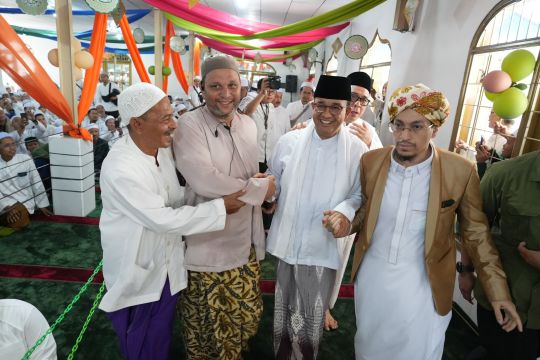
View On WordPress
0 notes
Text
THE HERO SAYYID KALINGALAN CALUANG
Capt. Kalingalan Caluang son of Caluang, Caluang son of Panglima Bandahala, Panglima Bandahalan son of Satyu Munu, Satya Munu son of Qasim(Father’s side)
Mother’s side: Capt. Kalingalan Caluang anak sin Muhayla, Muhayla anak sin Padukka Salih
From the Descendants of Ghawth Azam Sayyiduna Shaykh AbdulQadir Jilani qaddasallahu sirrahu

Founders: Capt.Kalingalan Caluang, Rashid Lucman, Salipada Pendatun, Domocao Alonto, Hamid Kamlian, Udtog Matalam, Atty. Macapantun Abbas Jr.
From Norodin Lucman:
THOSE WHO IGNORE THE LESSONS OF THE PAST ARE CONDEMNED TO REPEAT IT.
Fast facts: Moro National Liberation Front
Philippine Daily Inquirer / 04:25 AM November 05, 2016
Moro National Liberation Front (MNLF)
Year founded: 1972
Founders: Nur Misuari and Hashim Salamat
Strength (Misuari’s faction): 3,000 (reports as of 2016)
Historical Fact

Founders: Rashid Lucman, Salipada Pendatun, Domocao Alonto, Hamid Kamlian, Kalingalan Caluang, Udtog Matalam, Atty. Macapantun Abbas Jr.
Salamat Hashim was a member of the Ansar el Islam, the Islamic wing of the BMLO under Sen. Domocao Alonto
From 1968 to 1972 the BMLO trained and financed about 30,000 Bangsamoro fighters, men and women, in guerrilla warfare. BMLO was supported by the Confederation of 19 Royal Houses of Mindanao and Sulu and most major Muslim political clans in Mindanao and Sulu.
BMLO was supported by Malaysian PM Tunku Abdel Rahman, King Faisal of Saudi Arabia, Pres. Gamal Abdel Nasser of Egypt, Ustaj Saleh Taynaz and Libyan Minister Saleh Bouyasir, who died in a plane crash in 1972.
MNLF emerged after it won support from Malaysia’s Tun Mustapha, head of the proposed Republik covering Sabah and Mindanao and Sulu, Libyan Pres. Muammer Khadaffi, Foreign Minister Aly Trekky and the OIC. Tun Mustapha confiscated the 2,000 FN rifles bought by Rashid Lucman in Belgium in 1972 earmarked for the revolutionary fronts in Lanao and Maguindanao.
MNLF declared the establishment of Mindanao Republik in 1972.
(SOURCE: EYEWITNESS)
Origin: The MNLF was a splinter group of the Muslim Independence Movement, later called the Mindanao Independence Movement, which was founded in 1968 to work for a separate Moro state in the southern Philippines.
Gov. Udtog Matalam, brother in Law of Gen. Salipada K. Pendatun, declared Mindanao Independence when his son was killed by NBI agents in 1968. His son Udtog “Jun” Matalam Jr. was active in the BMLO.
Ideology and goal: The MNLF initially sought a fully independent state for the Moros, but its leadership accepted autonomy under the 1996 Final Peace Agreement.
Currently, the MNLF is divided in its aims, with some factions supporting MILF-government talks and the proposed Bangsamoro region, while other factions strongly oppose the proposal, insisting on full implementation of the 1996 agreement.
Major attacks:
Sept. 9, 2013 — MNLF members entered Zamboanga City and attacked government forces and took some 300 civilian as hostages.
Oct. 10, 1977 — Thirty-four military officers and soldiers, including Brig. Gen. Teodulfo Bautista, were killed in what came to be known as the Patikul massacre in Sulu province.
Moro Islamic Liberation Front
(MILF)
Year founded: 1977
Founder: Hashim Salamat
Strength: 12,000
Origin:
The MILF broke away from the MNLF because of ideological and political disagreements between Salamat and Misuari. Salamat Hashim accused Nur Misuari of giving away the Bangsamoro revolution to Libyan Pres. Muammar Khadaffi and First Lady Imelda Marcos through the 1976 Tripoli Agreement. Dimas Pundato broke away from Nur Misuari and organized the MNLF-Reformist Group in 1979–1980. (SOURCE: EYEWITNESS)
Ideology and goal: The MILF formulated a policy of gradually creating an Islamic society in the Moro regions. To accomplish this, the MILF applied Islamic law in the areas under its control and believed that the creation of an independent Moro state would eventually follow.
Major attacks:
Jan. 25, 2015 — Forty-four police Special Action Force commandos were killed in fighting with MILF guerrillas and members of the Bangsamoro Islamic Freedom Fighters while pursuing two international terrorists, including the Malaysian terrorist Zulkifli bin Hir, alias Marwan, who was reportedly killed by the policemen.
July 10, 2007 — Fourteen Marines were killed, 10 of them beheaded, while on their way home from operations to rescue kidnapped Italian priest Giancarlo Bossi in Basilan province.
— INQUIRER RESEARCH
Sources: Stanford University and
Inquirer Archives
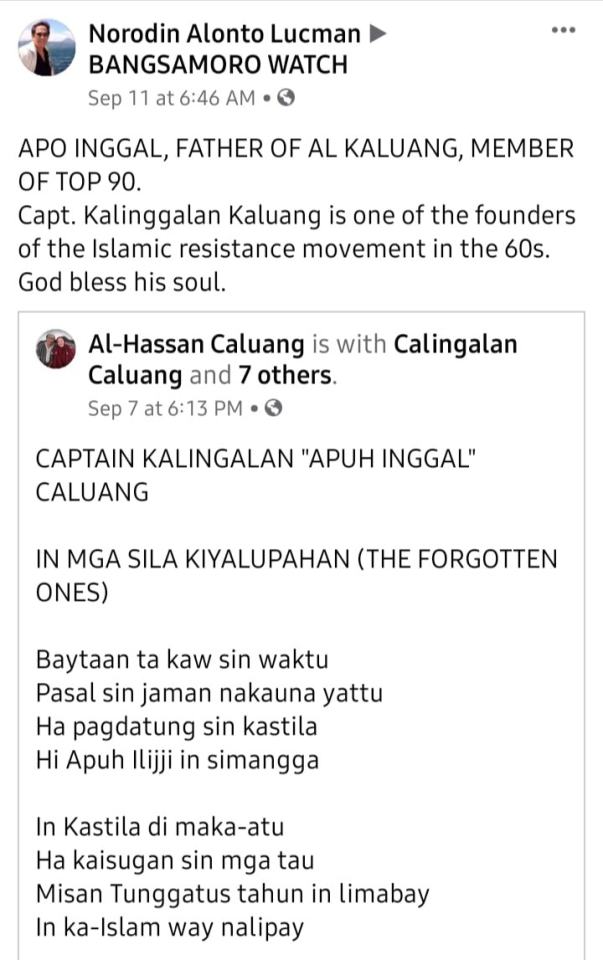
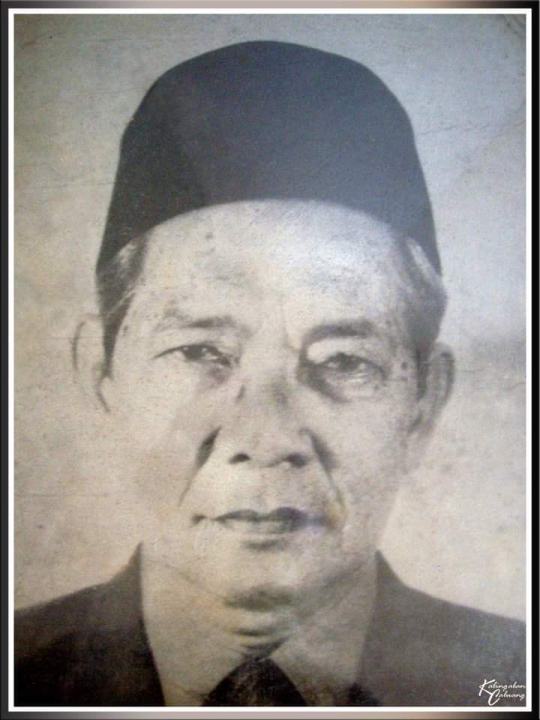
0 notes
Photo
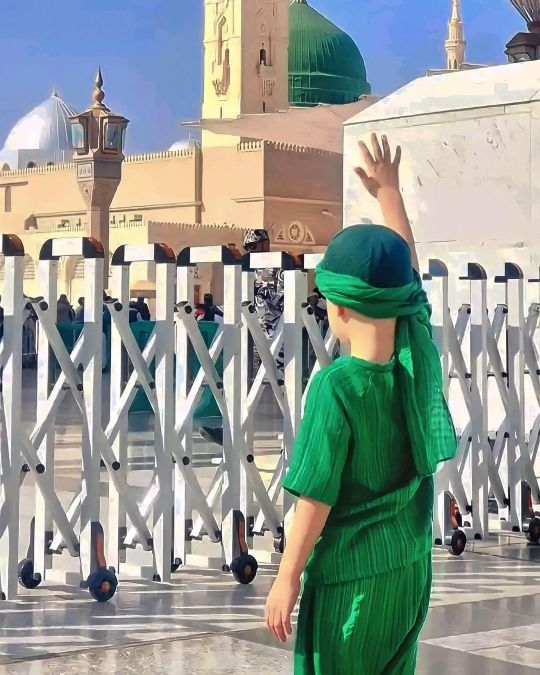
Watarana SAYYIDINA ALIYU (KARRAMALLAHU WAJ'AHU) ya tambayi ANNABI S.A.W cewa: يارسول الله دلنى على اقرب طرق الى الله واسهلها على عباد وافضلها عنده تعالى Ma'ana: Ya Rasulallah! Ka dora ni akan wata hanya mafi kusachi da Allah kuma mai saurin kai wa kuma mafi soyuwa A wurin Allah S W T فقال النبي صلى الله عليه وسلم عليك بمداومة ذكرالله سرا وجهرا Sai ANNABI S.A.W yace da SAYYIDINA ALIYU (KARRAMALLAHU WAJ'AHU). Na horeka da ka dauwama a cikin yin zikiri a Asirance da Bayyane فقال علي كل الناس يذكرون فحصنى بشيء Sai SAYYIDINA ALIYU (KARRAMALLAHU WAJ'AHU). yace ai kowa ma yana zikiri Ni dai ka kebance ni da wani abu قال صلي الله عليه وسلم افضل ما قلته انا والنبيون من قبلي لااله الا الله Sai ANNABI S.A.W yace Mafifichin abunda na fadi da ANNABAWA da suka gabace ni shine: LA'ILAHA ILLA LLAHU ولو ان السموات والارض فى كفة و لااله الا الله فى كفة لرجعة بهم ANNABI SAW yaci gaba da bayanin girman "HAILALA" yace Da za'a hade sammai da kassai a saka su a scaly (sikeli) a dauko HAILALA daya tak a saka a daya scale , da sai "LA'ILAHA ILLA LLAHU" ta rinjaya ولا تقوم الساعة على وجه لارض من يقول لااله الا الله Kuma Al-Qiyama ba zata tsaya ba matukar akwai (zakirai) masu fadin "la'ilaha illallahu" ثم قال علي فكيف اذكر قال صلى الله عليه وسلم غمض عينبك واسمع منى Sai SAYYIDINA ALIYU (KARRAMALLAHU WAJ'AHU) yace Toh yaya zanyi zikirin? Sai ANNABI S.A.W yace mashi Runtse idonka ka saurareni لااله الا الله لااله الا الله لااله الا الله ثلاث مرات ثم قلها ثلاث وانا اسمع ثم فعل ذالك برفع الصوت LAILAHAILLALLAHU sau 3 sannan ANNABI S.A.W yace da SAYYIDINA ALIYU (KARRAMALLAHU WAJ'AHU) fadi sau 3 nima ina ji Sai SAYYIDINA ALIYU (KARRAMALLAHU WAJ'AHU) ya daga murya ya aikata kamar yanda ANNABI S.A.W yayi Kuma SAYYIDINA ALIYU (KARRAMALLAHU WAJ'AHU) ya ci gaba da ba mutane wannan zikirin har izuwa ga su Sheikh Abdulqadir har zuwa yau ALHAMDULILLAH Amma a zamanin mu na yanzu wasu kuma basu da aikin yi sai fada da gaba ga masu fadin kalmar "LAILAHA-ILLALLAHU" kuma Abun mamaki wai su musulmai ne fa Domin karin Bayani duba "HADISIN DABARANI DA BAZZAR" duk sun Ruwaito https://www.instagram.com/p/CoU6LhNo9h0/?igshid=NGJjMDIxMWI=
0 notes
Text
WALIYY and AWLIYAULLAH (God's Friend [Saint] and God's Friends [Saints]): Part 4
Nujaba (The Nobles)
"Nobles" is a used for the "Fortys," or some among the "Fortys" included in the "Men of the Unseen." According to verifying Sufi scholars, these are the heroes of altruism who have completed their ascension toward God by going down among the people to guide and spiritually educate them. They think of nothing other than guiding people to God; they encourage hearts always to do good, and they erect spiritual barriers before evils. They try to confront possible misfortunes through prayers and supplications and they are ready to sacrifice themselves for the good of people or to prevent disasters. Their hearts always beat with feelings of self-sacrifice, compassion, and tender care for others. Since they have dedicated their lives to the happiness of others, they live a life overburdened with the troubles of others and sigh for them. Even if there are times when they feel happy at the news of others' happiness, they are always sorrowful because of what they have witnessed or heard concerning the sufferings of people. In respect of their mission, they are heirs to the Prophets.
Nukaba (The Custodians)
Nukaba are the saints who are always together with people, correcting their faults, and guiding all toward good with mildness and kindness. Although the term is used for those in the Sufi Orders of Rifai and Badawi who have completed their spiritual journeying and have begun the mission of guiding people to God, according to the verifying Sufi scholars they are the purified souls whose spiritual profundity and discovery transcend their scope of learning and sight and who always observe the spiritual domain or realm of existence; by God's leave, they are able to penetrate the hearts of people and what occurs to them. They carry out the duty of some sort of translation between the physical and metaphysical realms, interpreting existence in accordance with their capacity and in consideration of the understanding levels of their audience, and persistently try to find ways to God through everything. In their view, the universe is a meaningful book which contains messages within messages, with all its parts making up the words, sentences, and paragraphs. In these ever-wakeful souls and truth-voicing tongues, the truth expressed herein shows itself: The universe is a supreme book of God throughout, Whichever letter you look at, you read God.
Awtad (The Pillars)
Awtad are the four "Men of God" who are so close to one another that one cannot do without the other. They make their spiritual journeying and carry out their duties under the shadow of the missions of Enoch, Elijah, Jesus, and Khadr, upon them and our Prophet be peace. According to the particular mission of each, they have the titles 'Abdulhayy (The Servant of the All-Living), 'Abdul'alim (The Servant of the All-Knowing), 'Abdulmurid (The Servant of the All-Willing), and 'Abdulqadir (The Servant of the All-Powerful), and they reflect the spiritual content of Prophets Adam, Abraham, Jesus, and Muhammad, upon them be peace and blessings, or represent the reflections of their truths. Their connection with God is through the lenses of the Archangels Gabriel, Michael, Israfil, and 'Azrail, upon them be peace. They each correspond to a pillar of the Ka'ba, which signifies the door or stairway to that station.
Muhyi'd-Din ibn al-'Arabi is of the opinion that the Pillars are the seven saints who carry out their duties according to a hierarchy that exists among them.
Some call all the saints of God—including the Nobles, Custodians, and Pillars—the "Men of God" in the sense that they are heroes of the truth with certain spiritual power. Their most distinguishing attributes are their deep reverence for God and their feeling of awe before Him; being overwhelmed by the manifestations of the All-Merciful; arousing God's existence and omnipresence in the minds of those who see them; sobriety and dignity coming from the constant awareness of God's company; being deeply ashamed of certain ordinary human acts and states—even though they are lawful; being aware of God in everything in a different wave of sensation; self-forgetfulness when they are aware of God; continuous self-supervision and attributing to Him whatever gifts and blessings they are favored with; and remaining unknown by others. With respect to their being unknown, they are called "the Men of the Unseen" or "the Army of God." In one of his poems, Sultan Mehmed the Conqueror refers to those men who are endowed with a sacred spiritual power and asks for their prayers in carrying out the duty of serving God's Word.
With respect to these men's being able to make the Divine mysteries felt in the hearts of others, they are called "the Men of Conquest"; because of their being unknown or being known only by a few, they are known as "the Men of the Unseen." In regard to their generally living in ecstasy, they are called "the Men of Power," and because they approach everyone with gentleness and tolerance and return evil done to them with good, they are "the Men of Kindness."
#allah#islam#muslim#god#revert#convert#quran#ayat#help#hijab#religion#reminder#dua#salah#pray#prayer#sunnah#hadith#prophet#muhammad#muslimah#welcome to islam#how to convert to islam#new convert#new revert#new muslim#revert help#convert help#islam help#muslim help
1 note
·
View note
Text
PATIENCE AND COMPLETE FAITH IN ALLAH Subhanahu wa Ta’ala
It is not allowed to say: “What thing should I do? How can I deceive others about this? " People are dismayed that you so often say: "What should I do?" "What will happen at the end of my act?" The answer for you is: "Stay where you are and be grateful for your state." You have been commanded to abide in the state in which you are. He who commands will one day open the ways. Everything will become the way it has to be by itself.
Understand the commandments of Allah correctly and read: “O you who believe, be patient. Help one another on the path of patience. Stand firm together. Fear Allah. It is hoped that through this you will be successful. "(Surah Al-Imran, verse 200)
O you who believe, in this verse Allah commands first to be patient, then to help one another on this path of patience and then to be steadfast together. Then He declares that it is a great sin not to do these things and says, "Fear Allah." The obvious meaning of this is, "Do not leave patience. The good and salvation are in it." To indicate the greatness of patience, one hadith says: "The relation of patience to Iman (faith) is like the relation of the head to the body." (Hadith Jamiussagir, No. 5136).
The great ones have the saying: “Any good thing should be done with patience. Whoever does a good thing gets a reward from Allah that is as great as the patience for doing this thing. " There are people who say about this saying: "You don't get anything good for your patience."
But Allah says: "Verily, the patient will be given an immeasurably big reward." (Surah Zumar, verse 10)
As long as you stay away from bad things, Allah is your helper. Have patience and wait for the result. You will receive as much reward as your patience. The great ones leaned on the tafsir of this verse and said: “Allah opens the way of lightness to those who fear God. He takes care of them from wherever He wants." Wait. And wait with patience. Wait till death comes. May the Iman and patience be your supports in this waiting time. Only rely upon Allah. Because Allah says: "And whoever relies upon Allah - then He is sufficient for him." (Surah Talaq, verse 3)
As long as you have patience and tawakkul (trust in Allah), you will be one of those who do good things. Here a verse according to this: "And Allah loves those who do good." (Surat Al-Imran, verse 148) In this world and in the hereafter, patience is the beginning of all good. The believer rises as much as he has patience. The (spiritual) level of reward and sake is reached with patience. Then with patience one reaches the stage of nothingness at which one sees divine action. And then the level of Ebdal (chosen friends of Allah) and the world of the eternal Farah (relief, happiness) begins.
Take care and do not lose your patience, otherwise you will get into an embarrassing situation, be ashamed and lose in this world and in the hereafter. Allah forbid! The good in both worlds would then fly out of your hand.
Shaykh Sayyid Abdulqadir Jilani, Futuh Al-Ghaib, "The haram thing", Chapter 30)
0 notes